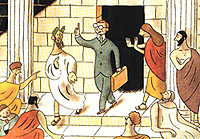 |
 |
05.25.06

Leadership is PhilosophyIn a lighthearted and engaging way, Matthew Stewart makes a case for the need to make management education a function of the philosophy department. The tragedy for those who value their reading time, is that Rousseau and Shakespeare said it all much, much better. In the 5,200 years since the Sumerians first etched their pictograms on clay tablets, come to think of it, human beings have produced an astonishing wealth of creative expression on the topics of reason, passion, and living with other people. In books, poems, plays, music, works of art, and plain old graffiti, they have explored what it means to struggle against adversity, to apply their extraordinary faculty of reason to the world, and to confront the naked truth about what motivates their fellow human animals. These works are every bit as relevant to the dilemmas faced by managers in their quest to make the world a more productive place as any of the management literature.All leadership issues are human. Leadership is not a science. It is an art. This idea of the NEW leadership is nonsense. Contexts change and will continue to change but leadership principles are constant. Leadership is about people and relationships. People have had to deal with the same issues since time began. Leadership deals with philosophical issues in ever changing contexts. While certain generalities can be made (reduced to percentages if you must) most leadership issues must be viewed more individually than generally, more philosophically than scientifically. Having laws that govern something doesn't make it a science. Beyond building skills, business training must be about values . . . But, as anyone who has studied Aristotle will know, “values” aren’t something you bump into from time to time during the course of a business career. All of business is about values, all of the time. Notwithstanding the ostentatious use of stopwatches, Taylor’s pig iron case was not a description of some aspect of physical reality—how many tons can a worker lift? It was a prescription—how many tons should a worker lift? The real issue at stake in Mayo’s telephone factory was not factual—how can we best establish a sense of teamwork? It was moral—how much of a worker’s sense of identity and well-being does a business have a right to harness for its purposes?
Posted by Michael McKinney at 12:52 AM
|
BUILD YOUR KNOWLEDGE
 

How to Do Your Start-Up Right STRAIGHT TALK FOR START-UPS 
Grow Your Leadership Skills NEW AND UPCOMING LEADERSHIP BOOKS 
Leadership Minute BITE-SIZE CONCEPTS YOU CAN CHEW ON 
Classic Leadership Books BOOKS TO READ BEFORE YOU LEAD |